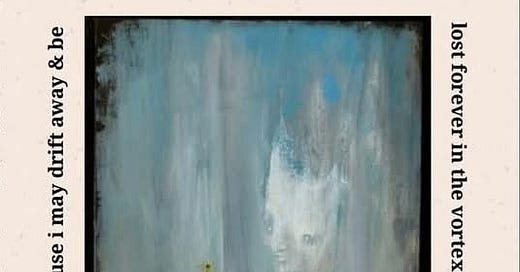Between Desire and Doom: A review of John Compton's “my husband holds my hand because I may drift away and be lost forever in the vortex of a crowded store"
Written by Andrew Rader Hanson
The title of John Compton’s book, my husband holds my hand because I may drift away and be lost forever in the vortex of a crowded store, evokes the relationship between the stable, warm, comforting hand of the husband at one point and the vortex of the crowded store at the other. Very much in line with Compton’s title, in this book, the speaker surfs between a familiar desire and this strange, hostile vortex that consumes, destroys, and disembowels life. Compton’s book is a magisterial exercise in the desires, images, relations, and uncertainties that punctuate the body of the digital age.
These poems channel such chaotic energies into vertical, terse, and sometimes controlled phrases, between images and sounds that summon the hush of prayer: “your chest becomes / my confessional”. But this reverential voice is also harnessed against economies of shame and slavery: “their devotion / is to catch us, call it prostitution, & pay us / with condemnation”. Compton’s verses demonstrate a careful attention to how desire transforms the world and vice-versa.
However, the book does not swerve from bolder, more irreverent tones as it confronts American political discourse: “your war hand, holds grenades,” “you saturate yourself / with smokescreens.” The “saturation” and “smokescreen” aptly depict the toxic and opaque environment that U.S. elites and their media subject the American senses. Compton pronounces poetic judgment upon this political dynamic: “notice what you’ve done / disguising what love is”.
In addition, Compton envisions the extraterrestrial embodied, pulsing from thousands of miles away: “the stars / are blond eyes / watching us.” This description illuminates the majestic lights of the cosmos as eyes, allowing these distant and possibly dead stars a seat at the unfolding theater. The poet thus renders distant objects visceral throughout the work.
But before you can come to grips with the lightyears of distance, the white star might transform into a tic-tac or even a maggot. With these transformations of object and space, Compton “whirls through [the] transfigurations” of the school, the bedroom, and maybe even solitary confinement, in which each wall is transformed into skin. The many transfigurations of the poetry may induce a vertigo: one feels as if in a cool dark room watching a solitary mouth spit epics of death and desires like Lisa Dwan’s performance of Samuel Beckett’s “Not I” at The Barbican theatre. Transformations in this book of poetry are uncanny as a Giuseppe Archimbolo piece.
In “poem for poets like me,” the speaker recounts the Beat poet John Wieners and his entourage through poetry: “loving the men he was around / envious / ones i will never meet / ones i’ll only drink up with words”. This is Compton characteristically imparting a streak of desire between the reader, the speaker, John Wieners, and his entourage. Such a streak is a salient reminder that desire transcends the wispy corridors of time and can be “drunk up with words”.
However, just as Compton introduces this third party into the poem, the speaker, perhaps a seasoned poet, kicks back at their desk: “i reach out to this lonely room / with a computer & chair…. / to write my hallelujah poems / to scatter them across the bodies of men / across the bark of trees”. This encounter with John Wieners the speaker constructs a type of poetics, one in which poetry is strewn across “bodies of men” and “tree-bark.” This rich imagery suggests the art of poetry as an active, dynamic process, directly encountering imagination, other, tree or human chest. The poems generally cross between multiple locations and perspectives and still are carefully wrought.
Compton’s book is well-worth a few reads, for its vivacity, honesty, reverence and irreverence, i.e. sentiment and symbol slippery and raw as the salamander or amniotic fluid. It is a nearly hundred page reminder that the body holds secrets that resolve at the touch or spill onto the page as poetry.
my husband holds my hand because i may drift away and be lost forever in the vortex of a crowded store
By John Compton
Published by Flowersong Press
93pgs
Paperback: 978-1-963245-74-5 | December 2024 | $15.00
Andrew Rader Hanson is a poet and photographer, who lives in South Florida. In his free time, he lifts weights, hikes, practices languages, and reads widely. His work has been published by Spectrum Literary Journal, Pembroke Magazine, The Hong Kong Review, and more. He was also nominated for a Best of the Net award and the Scottie Merril Poetry award. His book, This Warehouse Manufactures Thirst, is out now with Bottlecap Press.






If you haven't had the pleasure, get to know poet John Compton: